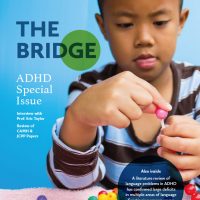Search results
-

Gender-specific pathways mediate the risk of substance use in adolescents with ADHD
Data suggest that children with attention-deficit/hyperactivity disorder (ADHD) are more likely to start smoking tobacco and/or marijuana earlier in childhood than unaffected children, and then escalate use during adolescence. Now, a study by researchers at the University of Minnesota has examined the mediating pathways underlying this association between childhood ADHD and later substance-abuse problems.
Read more -

Guidelines on service transition for young people with ADHD
Recent research has led to the increasing recognition that ADHD can often be a life span disorder, meaning that a subset of affected children will eventually need to transition to adult services. Unfortunately, much research has highlighted the difficulties experienced by young people in transitioning from children’s to adult services.
Read more -

In Conversation… ADHD with Dr Sinead Rhodes
In this podcast, Dr Sinead Rhodes discusses ADHD and neurodevelopmental disorders with freelance journalist Jo Carlowe. Sinead discusses her latest research, cognitive factors underlying mental health and tailored interventions.
Read more -

Self-Perceptual Bias and Internalizing Symptoms: Implications for ADHD
Attention-Deficit/Hyperactivity Disorder (ADHD) is a common childhood neurodevelopmental disorder, affecting 5 – 7% of school-aged children.1 Given that many children with ADHD experience difficulty paying attention and managing impulsive behaviors, it is not surprising that children with ADHD often struggle with basic tasks, such as schoolwork, daily routines, and social interactions.
Read more -

Reporting of depression symptoms in children with ADHD: do parents know best?
ADHD is a common neurodevelopmental disorder characterised by hyperactive-impulsiveness and inattention. ADHD often co-occurs with emotional disorders such as depression and anxiety. Depression in particular is prominent amongst adolescents with ADHD, and can be difficult to identify as it can have similar features both to ADHD itself and to some of the side effects of ADHD medication.
Read more -

Online ADHD service map aims to stop young people slipping through net
Researchers at the University of Exeter have released a map put together from the results of a national survey. The new map aims to help identify existing services and gaps in provision for young adults with Attention Hyperactivity Deficit Disorder (ADHD).
Read more -

Routine screening is needed to identify language problems in children with ADHD
In 2017, Emma Sciberras and colleagues conducted a Research Review for the Journal of Child Psychology and Psychiatry to rigorously analyse how common are language problems in children with Attention-Deficit Hyperactivity Disorder. Here, the researchers discuss their main findings and explain why they consider that a screen for language function would be a valuable addition to current ADHD assessments.
Read more -

Depression is highly prevalent but under-reported in children with ADHD
Researchers at Cardiff University have investigated whether the symptoms of depression observed in patients with attention-deficit/hyperactivity disorder (ADHD) differ from those reported in the general population.
Read more -

-

ADHD traits linked to tantrums in preschool children
A survey of 154 parents of French preschool children found that the children who were rated as being more emotionally labile were also prone to ADHD symptoms.
Read more